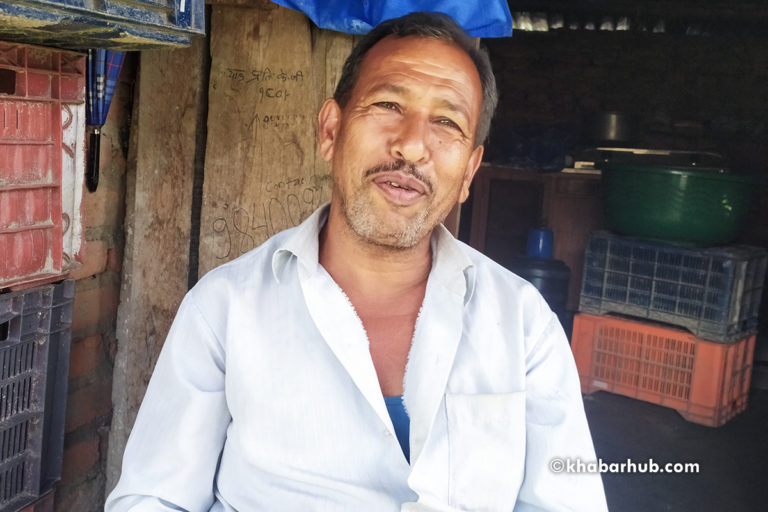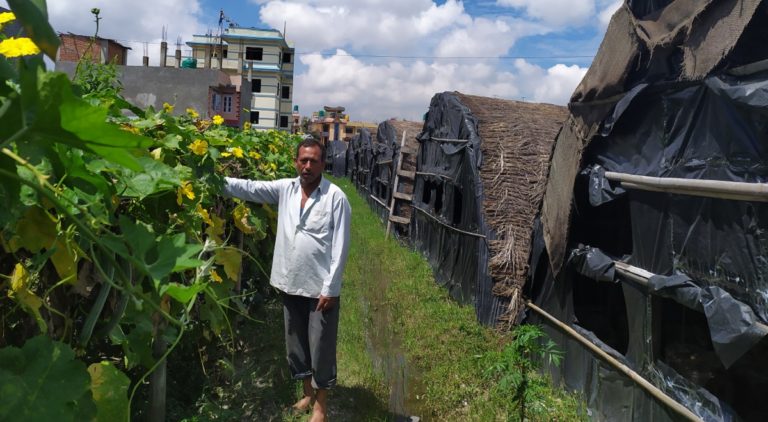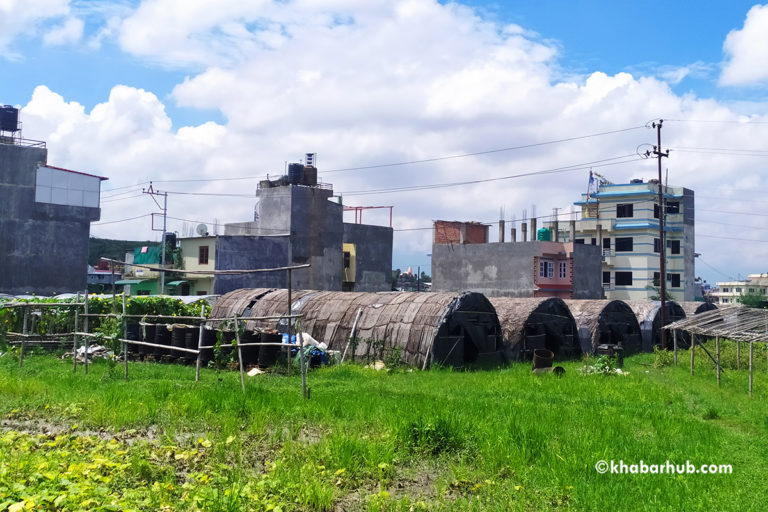KATHMANDU: Daily routine of Bhim Bahadur Katuwal, 60, begins from sunrise to sunset. Wrinkles are visible on his face. Hair has already turned grey. Yet, he is still agile, hardworking and dedicated to his profession. He has been engaged in mushroom farming business since the last eight years.
Born as the fourth son to his parents in a poor family in Dharan of Sunsari district in 1959, Bhim was deprived of education due to financial constraints.
“It was hard to even manage two square meals, going to school was a mere imagination.” He wanted to go to school like his childhood friends did. But he couldn’t. More responsibility fell on his shoulder after he got married in the age of 23 years.

Bhim came to Kathmandu in search of a job 36 years ago with a little confidence that he would get a job here. He rented a small room in Thimi, Bhaktapur. The very next day, he went out to look for menial jobs including that of a porter. “I used to earn Rs 9 per day,” Bhim shared with Khabarhub, adding, “I had to pay Rs 15 in rent for the room.”
One day Bhim was watching a television program. It was about mushroom farming that some Nepali youths were cultivating after returning home from overseas employment. It triggered an idea in his mind. He decided to try hand at mushroom farming after retirement from his job in Qatar.
“One day I went to Hattiwan, Lalitpur where I got a wheelbarrow pulling job and carrying bricks. I worked for three years there,” said Bhim. Thereafter, he took up a carpentry job. His earning also increased. With the increment in earning, he started cherishing his dream to go abroad.
He took a loan of Rs 70,000 from his landlord for this purpose and left for Qatar leaving behind his three sons and his wife in the rented room.
His woes plied up even further as things did not turn out as expected. His company did not pay him for three years. He still remembers those days when his wife telephoned him time and again to send money for school of their sons.
The company paid him only after three years, that, too, only the half of what had been promised. He changed the company. He received better salary there compared to before. He started working from dawn to dusk. He paid back the loan after 11 years and started saving some portion of his salary.

One day Bhim was watching a television program. It was about mushroom farming that some Nepali youths were cultivating after returning home from overseas employment. It triggered an idea in his mind. He decided to try hand at mushroom farming after retirement from his job in Qatar.
In 2068 BS after his retirement, he took six ropanis of land on lease of Rs 150,000 per year for mushroom farming in Dakshindokha.
He built 10 sheds for mushroom farming and cultivated cauliflowers, tomatoes, beans, pumpkin, ridge gourds, bitter gourds, egg plants and chili in the remaining area of land. His mushroom business started flourishing and provided employment to 10 people in his farmhouse.
Bhim spends Rs 5,000 in mushroom farming. It takes around 25 days for the mushroom seeds to get matured for harvesting. When sold, it fetches Rs 1.5 million to him.
Straw is needed for cultivating mushroom. The straw should be cut into pieces, soaked in a pot of boiling water for around three hours. Then it should be kept into a plastic bag with mushroom seeds and hung in dark, moist sheds.
According to Bhim, it takes 45 days during winter and 25 days in summer for mushroom to get ready for harvesting. Caustic lime should be applied if the mushroom gets infected with disease. A plastic bag, once stuffed, can be used thrice for mushroom production.

After a hard-work and dedication to the field of mushroom business for almost three decades, he has built a three-story building in Makalbari, Kathmandu. Even though he could not study, his sons are doing well with their studies. One of his sons is pursuing higher study in China, another one in Norway while the youngest son has completed master’s degree. “I am happy to afford higher education for my sons even by toiling hard in the foreign land,” said Bhim.
During a period of eight years, Bhim has not only brought massive changes in his family but also shared knowledge of mushroom farming with many people. Ten among them have been doing mushroom farming.









Comment